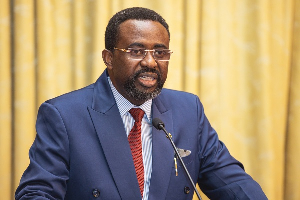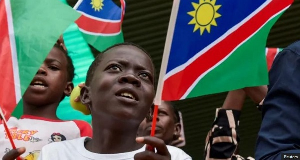Accra, Oct. 24, GNA - The Ministry of Education, Science and Sports would introduce discriminatory funding policy to make sure that development linked educational programmes were promoted, Papa Owusu-Ankomah, Sector Minister, said on Tuesday.
He said as a policy, the Government would ensure that students pursuing development linked programmes in the area of science and technical skills received priority in intake into tertiary institutions while restricting access to oversubscribed programmes that were not development associated.
Papa Owusu-Ankoma was speaking at the third National Employers' Conference and the 46th Annual General Meeting of the Ghana Employers' Associating (GEA) in Accra.
The conference which was on the theme: " Labour Market Needs and Training Institutions: the Acquisition of Employable Skills" was to enable the Association and its partners assess the skills gap on the labour market and recommend measures to bridge it.
Papa Owusu-Ankomah explained that programmes offered in the Ghanaian training institutions were skewed towards subjects in the humanities as a result of which even the polytechnics, which were more technical inclined, were currently admitting more people for business related courses instead of science and technical subjects. He said the National Council for Tertiary Education approved ratios for science and technology in relation to business related programmes in Polytechnics to be 60 to 40 from a ratio of 55 to 45 in 1996 and 1997. He said this had changed to become 40 to 60 in favour of the business related subjects.
"This obviously goes contrary to the mandate for which the Polytechnics were set up," he said adding that "the scenario at our universities is not different from what has been described ...and steps have been initiated to reverse this trend".
As part of the measures, Papa Owusu-Ankomah said the Government would soon ensure that funding for programmes in the tertiary institutions and other training institutions were directly linked to the development agenda of the country.
The measure would involve curriculum and content rationalization of programmes; major review of the relevance of some programmes and the justification for the continuous running of some programmes. Papa Owusu-Ankomah said if possible, students' loan would even be streamlined to favour science and technical oriented students. The labour market, he said, was characterized by many deficits such as the curricula and content of programmes that did not meet the demands of employers, relevance of programmes, the dexterity of graduates, relevant skills and competencies and exposure to global and international competition.
He said the future of the country depended on the continued renewal and regeneration of the leadership and citizenry and that the Government recognized the need to resource the training institutions for them to provide the required employable skills for the labour market. He said with the passage of the Council for Technical, Vocational and Training Bills and the focus on technical and vocational education as one of the pillars of the education reforms, re-sourcing of the training institutions had become even more imperative and would be given the priority attention it deserved.
Papa Owusu-Ankomah said the Japanese International Cooperation Agency and Association of Ghana Industries collaboration with the GEA for the development of a directory of companies willing to take on students on attachments had taken too long to become operational and called on interested parties to take immediate action on it. He said the Government was ready to take action on the recommendations from the conference, which would discuss survey results on employment trends in the country.
Alhaji Abubakar Saddique Boniface, Minister of Manpower, Youth and Employment, said the theme and the timing of the conference was appropriate because it coincided with the beginning of the implementation of the Growth and Poverty-Reduction Strategy II which had embedded in it the issue of employment creation and management. He said the Government could not do it alone but had the duty to create the enabling environment to produce the critical mass of skilled manpower to drive the growth in the economy.
"I believe this cannot be done by Government alone, neither industry nor educational institutions can do it alone. It is the responsibility of all the three parties to develop a strategy for doing this."
Alhaji Boniface urged industry and employers to take advantage of tax incentives by the Government to employ the youth for attachment. He said the Government would pay part of the salaries and wages of those engaged.
He also called for the promotion of a successful business model for training institutions to address issues such as teachers having renewable contracts that were subject to periodic evaluations; give close monitoring to graduates; create strong links with enterprises through governance; delivery of training services; in-service training services and financial sustainability.
Dr Charles Mensa, President of the GEA, said there was the need to produce highly skilled human resources if Ghana was to compete effectively on the global front.
He said the nation needed an efficient labour to match the demand and supply side of labour for the socio-economic growth of the country. Dr Mensa observed that the current trend was the constant production of supply of labour that did not meet the demand side. He cited the example of Valco, which now had to rely on expatriate for expertise on the processing of bauxite because the nation did not have the skills.
"We were just lucky to have been introduced to a Ghanaian Professor who has written a thesis on bauxite and is willing to make the knowledge available to us."
Dr Mensa said apart from the Professor, all the studies available to the company had been coming from the United States and elsewhere and noted that the nation did not have to wait for people to bring their expertise at a huge cost and call it an investment when the Government would have to provide the money for the said investment. "We need to look into the future and produce the skills we need up to 2015 and work towards it."
Mr Charles Cofie, Chief Executive of Unilever Ghana Limited, said the last two budget statements of the Government had highlighted educational programmes while the Ghana Education Trust Fund GETFund had also assisted in re-sourcing of some institutions in addition to the granting of incentives to create jobs.
He said the incentives on its own did little to accelerate job creation when the companies had to compete with others in the face of unbridled competition and WTO protocols.
Mr Cofie said it was necessary that Ghanaian graduates were taught to think clearly, write with precision and to speak eloquently because "in the job market we communicate our thoughts with superiors primarily in writing".
He said there were powerful, faster and efficient means to harness ICT and tap into the ideas of global consumers and customers in today's networked and interconnected world.
Mr Cofie questioned how well the Ghanaian training institutions were imparting new age thinking; emerging market developments and entrepreneurial skills to would-be job-seekers and urged the country to bridge the skills gap through efforts such as was found in countries like Malaysia, which had a strong campaign to align its universities and polytechnics to deliver usable industry relevant skills.
Presentations of survey results on skills gap by Oxia Ghana Limited, a consultancy company, and the Ghana Industrial Skills Development Centre based in Tema, indicated that the majority of vacancies were hard to fill and that the difficulty laid with the lack of technical skills, lack of work expertise and competition from other employers which were willing to pay higher remuneration than the employing company.
The surveys also identified the lack of IT skills as one of the difficulties in recruiting people. 24 Oct. 06
General News of Tuesday, 24 October 2006
Source: GNA
















